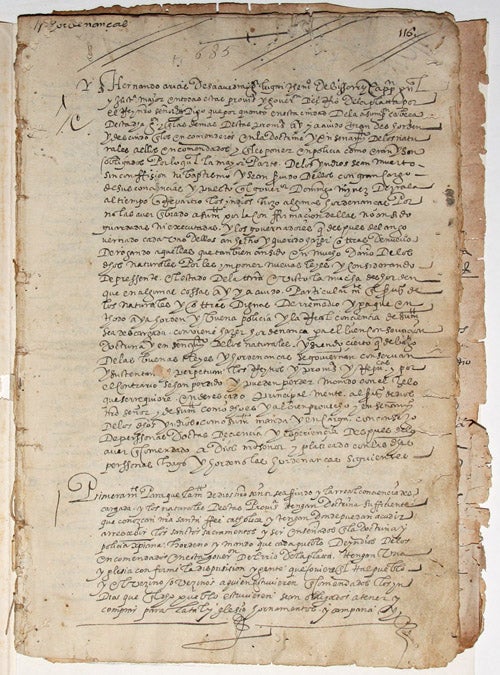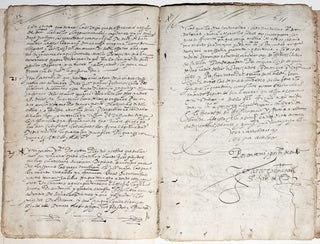Manuscript written in ink on paper in a neat Spanish cursive hand, (7) ff., verso of final leaf blank, eg 13 written pages, c. 40 lines per page. Asunción [Paraguay], 12 December 1598, dated and signed by Hernandarias on final leaf (7 recto). Offered with 7 ff. of misc. MS material. Some wormholes and fraying to the margins, but perfectly legible.
Important 16th century manuscript of colonial ordinances governing the daily life of the Indian population, written in Paraguay, signed and dated 1598 by the colonial governor. Hernandarias (1561-1634). Hernandarias was the first person born in the Americas to become governor of a European colony in the New World.The manuscript is relevant to the most important political act of Hernandarias’ tenure as governor of Paraguay: the abolition in 1603 of the system which degraded and controlled the indigenous population in all but name as slaves. While the bureaucracy of the Spanish colonial system produced a mass of manuscript documentation, dated 16th c documents written in the New World have become uncommon and are highly sought after.
The lynchpin of the Spanish colonial system in South America was the encomienda, in which a fixed number of Indians were assigned to conquistadors or soldiers as a reward for service. These indigenous peoples were compelled to pay tribute to their masters, with a percentage reserved for the Crown. Hernandarias’ proclamations of 1598 contained in the present document show a significant if gradual advance over the harsh conditions of the encomienda system. The first ordinances describe the newly installed King Philip III’s concern for the spiritual salvation of his native subjects and their need for religious instruction.Regulations 5,6, and 8 forbid forced transfer of Indians from one encomienda to another without the governor’s permission; regulations 10,11,and 12 ban general mistreatment of Indians, interfering with their customary fishing and hunting, the inhuman dissolution of families, etc. Not all of the ordinances were so clement, however: no. 18 restricts the right of Indians to migrate or travel. Fines and prison sentences are set forth to punish disobedience by the ruling population – with all proceeds going to the Crown, but not the Indian victims.
Hernandarias’ legacy would be the historic abolition of the punitive encomienda system in 1603.The present document shows that the governor’s change of attitude was a gradual process, and not the inexplicable “about face” it has previously been taken by historians to be. Some authorities have speculated that this evolution may be due to his remote descent from criollos (persons of mixed ancestry); but it has also been remarked by his contemporaries that, unlike the majority of colonial governors who used their virtually absolute power to loot and plunder their subjects, Hernandarias was not only a highly competent administrator, but a decent man.
* Published in 1905 as "Derechos de los Indios y su protección" in Revista de Derecho, Historia y Letras XXIII, pp 370-381. Cf also Quintín Aldea Vaquero, El Indio peruano y la defensa de sus derechos (1596-1630), pp. 160-63.
Price: $28,500.00


